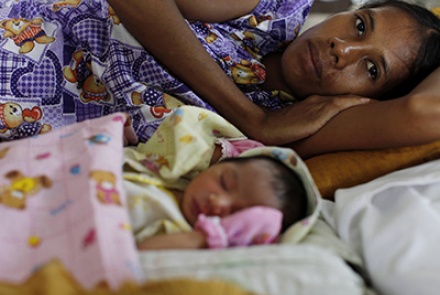
Trump funding cut a dangerous decision
The Trump administration’s announcement will undermine the rights of women and girls to control their bodies. Make no mistake, warns Sharon Bessell, for some, the decision will be a death warrant.
The birth of a child is usually a cause for celebration; a moment of wonder, as a new tiny life enters the world. This celebration plays out across the world every day when a wanted child is born to a woman who is supported on the journey to motherhood.
But in some parts of the world, in some situations, the birth of a child is a devastating event. Every day, children are born to women and girls who did not choose to become pregnant. Rather than a moment of celebration, the birth of a child in these circumstances is the manifestation of a woman’s – or girl’s – complete lack of control over her body and life. Daily, children are born with no trained birth attendants present, to women – and girls – who labour without intervention when it is desperately needed. Daily 830 women die in childbirth; the vast majority in developing countries.
Let’s just repeat that figure: every day 830 women and girls die in childbirth.
They die from bleeding, infection, pre-eclampsia and eclampsia, and complications during delivery. Most causes of maternal death are preventable or treatable. When governments step back from supporting safe and accessible sexual and reproductive healthcare – as the USA did in withdrawing funding from the United Nations Population Fund (UNFPA) last week – more women will die. That is the reality.
Global progress and the role of UNFPA
Between 1990 and 2015, considerable progress was made, with maternal mortality declining by about 44 per cent. From 2000, improvements accelerated in the wake of the adoption of Millennium Development Goal 5 on improving maternal health. This is the good news, but the situation remains dire for many women and girls, and continued progress remains fragile.
UNFPA has been at the forefront of global efforts to make childbirth safe for both women and their babies and to ensure that women and girls have access to reproductive health care and safe, reliable forms of contraception.
The goal of UNFPA is to deliver a world where every pregnancy is wanted, every childbirth is safe and every young person’s potential is fulfilled. This is an aim that should not be subject to debate. Who could possibly argue that women and girls should be forced into pregnancy against their will, that childbirth should not be safe, that the potential of young people should not be fulfilled?
And yet, the work of UNFPA and other organisations that aim to provide women and girls with choice over their lives and – when they choose to become mothers – to provide safe and supported pregnancies and childbirth, continues to come under attack.
The US withdrawal of funding
Last week, the Trump administration announced that it will end funding to UNFPA – it gave the organisation US$75 million in 2015. Announcing the withdrawal, the US State Department claimed that in partnering with the Chinese Government, UNFPA is implicated in the coercive practices used in China to curb population growth.
This issue is a complex one. No doubt, often brutal coercion has underpinned the approach of the Chinese government in the past, and women’s right to make decisions about the number of children they have continues to be regulated. China’s One Child policy, introduced in 1979, has been the subject of criticism both within and outside China. The policy was loosened in 2013, and ended in 2015; from the beginning of 2016, a two-child policy was introduced.
While China’s approach to family planning is rightly controversial, there is no evidence to suggest that UNFPA has ever been involved in or supported coercive practices. There is, though, overwhelming evidence that UNFPA works tirelessly, in China and elsewhere, to prevent women and girls being subjected to coercive sexual activity and to unwanted pregnancy.
At a recent talk at Crawford School of Public Policy, executive director of UNFPA, Dr Babatunde Osotimehin spoke powerfully of the importance of women and girls being empowered to take control their sexual and reproductive health and to exercise their rights as human beings. In an accompanying interview I was involved in for Policy Forum, Dr Osotimehin explained the role of UNFPA in providing support, services and education in countries around the world, and particularly in contexts of humanitarian and natural disasters where women and girls are especially vulnerable.
Withdrawing funding from UNFPA is a direct assault on the services that are vital to securing women’s and girls’ well-being and human rights.
The complexities of abortion
Central to the US decision to withdraw funding to UNFPA is the allegation that the agency has supported forced abortions in China. UNFPA does not promote abortion as a method of family planning, nor does it engage in debates about the legal status of abortion. The agency does advocate for, and support post-abortion care and argues that health systems must deal with complications that result from unsafe abortions and are often life-threatening.
In the US, the politics of abortion are deeply divisive domestically and have shaped policies towards international development assistance for decades. The Kemp-Kasten amendment to the appropriations bill was adopted in 1985, prohibiting the provision of US aid to any organisation determined by the US Administration as supporting coercive abortion or forced sterilisation. The prohibition of such violations of women’s rights is on the face of it welcome, yet the Kemp-Kasten amendment has been used in highly political ways that have little to do with supporting the rights of women.
The amendment was used by the Bush administration in 2002 to withdraw funding from UNFPA, a decision that was later reversed by the Obama administration. The most recent enactment of the Kemp-Kasten amendment reflects the continuing division between Republicans and Democrats on foreign aid and engagement with global development priorities. It also highlights the extent to which those debates play out through control over women’s bodies.
The politics of women’s bodies
The politics of sexual and reproductive health and rights are deeply worrying – and here we see regress rather than progress with the US Government’s most recent position. The withdrawal of US funding to UNFPA follows the ‘Presidential Memorandum Regarding the Mexico City Policy’, issued by Trump on the first full day of his presidency. That order went further than previous Republican administrations in the restrictions it placed on organisations providing a range of health services in developing countries.
The order – commonly known as the ‘global gag rule’ – requires organisations to certify that they will not use either US funds or non-US funds to provide abortion services, to counsel patients about the option of abortion or to advocate for the liberalisation of abortion laws
The order was met with alarm by organisations around the world who provide a wide range of health services, as well as those dealing with the realities and complexities of women’s lives and the difficult decisions women must make in situations of unwanted or forced pregnancy.
That many women have no choice but to seek abortion when contraception is unavailable or unreliable, and when they have no control over the bodies, appears lost on Trump and the cartel of suited, middle-aged men who surrounded him as he signed the executive order in January.
The use of women’s bodies to advance particular ideological and political agendas is not new. Nowhere is this more apparent than in global debates about women’s and girls’ right to access reproductive and sexual health services, including safe and reliable contraception and safe abortion. Abortion is often used by ultra-conservative groups as the justification for denying women a range of sexual and reproductive health services.
That very few women use abortion as contraception; that women and girls who face the awful dilemma of dealing with an unplanned, unwanted and perhaps life-threatening pregnancy will seek abortion whether it is safe and legal or not; that an estimated 47,000 women and girls die every year from unsafe abortions is peripheral to the politics of control that prevent women and girls making decisions about their bodies.
The withdrawal by the Trump Administration of funding to UNFPA signals a disturbing disregard for the health and human rights of women. It is counter to global discourse that promotes the empowerment of women and the right to access health care. It is a decision that disregards evidence and reason. It is a decision that will undermine the rights of women and girls to control their bodies and, for some, it will be a death warrant.
This piece was first published by Policy Forum.net, the website of the Asia and the Pacific Policy Society and Crawford School. https://www.policyforum.net/trump-funding-cut-dangerous-deadly-decision/
Updated: 18 July 2024/Responsible Officer: Crawford Engagement/Page Contact: CAP Web Team













